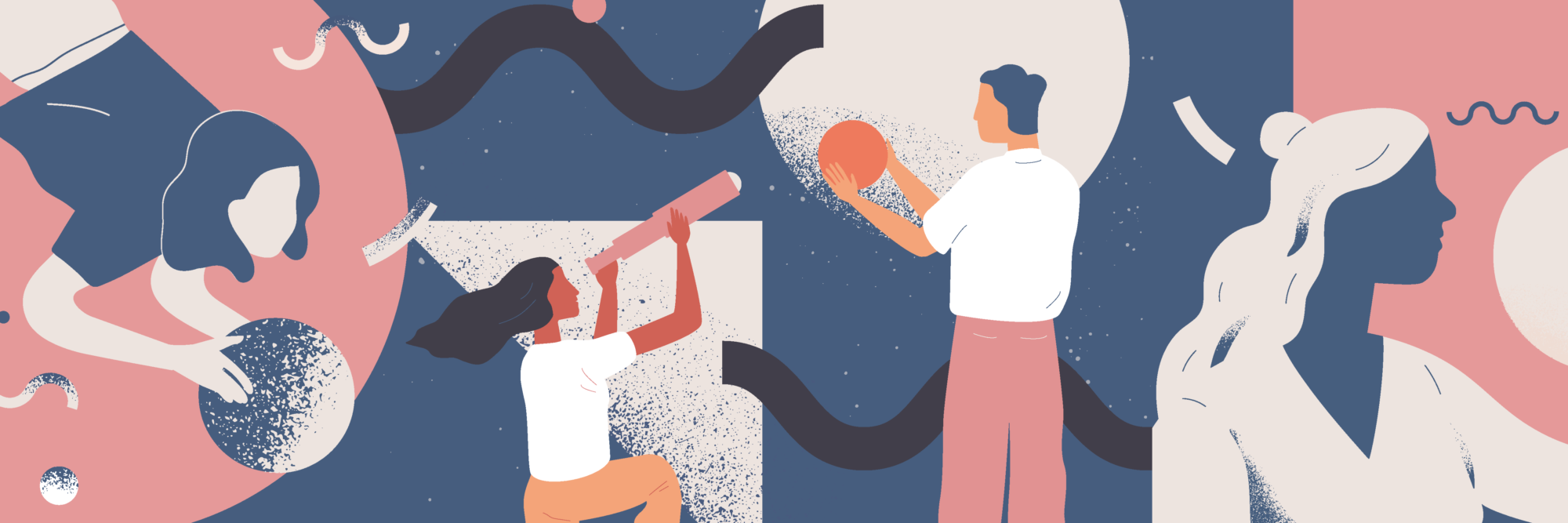
In brief
In this blog, originally written for and published by Nesta, David asks the question:What can we do to keep the community spirit that was amplified by lockdown alive and make 2020 the year we changed for good?

Some of us have suffered loss in recent months. Many have been anxious and uncertain. Most have been separated from the ones we love. These are life-changing experiences, shared by us all. What we thought and felt and how we behaved mattered not only in the moment: it will influence how we think and feel and behave in the future.
There is now an impatience to “return to normal” – but the aspiration underestimates the impact of the pandemic and especially of the lockdown. Historian Peter Hennessy believes his successors will “divide British post war history into before corona and after corona”, such has been the scale of the social and economic disruption. In this critical time, between the before and the after, we need to understand the learning and embed the positives – and we need to be bold, because we don’t have long.
The undercurrents
Shortly before lockdown, The Relationships Project set up the Relationships Observatory to gather insight from a host of volunteer observers from all walks of life on the effects of COVID-19 on our social behaviour. None of us knew exactly what to expect, but it was evident that our social behaviour was about to fundamentally change. After 100 days we published our initial findings in a report, The Moment We Noticed, focusing on the “undercurrents”, shifting attitudes that could prefigure more profound change.
We saw the emergence of behaviours which are more trusting, principle-led rather than rules based, cemented by solidarity rather than compliance, less defensive, more can-do, kinder, more emotionally responsive, more personal and more human.
These undercurrents were dominant but not universal. We also heard about communities applauding key staff on Thursday evening and criticizing the mainly young, lower paid, often migrant, workers at the bus stop on Friday morning. Bonding within broadly homogenous groups has developed rapidly with the explosion of hyperlocal mutual aid, but connections between groups have been breaking down with increasing frequency. As the differential impact of the virus becomes more apparent, the release from lockdown more varied and a recession kicks in, the potential grows for scapegoating and division down the familiar fault lines of age, ethnicity and socioeconomic group.
I want to focus here on the positives, because these are the building blocks of a better future.
But we must also recognise both the context and the time scale. Social capital surveys in the US following 9/11 showed a six month swing “from me to we” – from individuality to civic mindedness – then just as quickly back again.
From our research, we have identified the following learnings and actions for everyone, from central and local government through to the individual citizen.
Knowing our story
We become the story that we tell ourselves: if we tell ourselves that we were divided and diminished by the pandemic, we will emerge divided and diminished.
Many organisations and communities have a better, more confident story to tell – and we believe that only stories can truly capture the values of this time and carry them forward.
To this end, we developed the Spirit of Lockdown storybook – a simple, downloadable tool to inspire a conversation about how we can build back better, stronger and more connected. Some people may say this isn’t a serious project – it’s not about “systems change” or “roadmaps”. We say there is no value in a roadmap without a compass.
Nurturing the ecology
During the crisis, 10 million people have spent at least three hours a week caring for others; 78 per cent say they want to carry on. Ministers call this a “volunteer army” – but few actually describe themselves as volunteers. It is much more grassroots than Neighbourhood Watch, with little structure, formality, or uniformity.
Trying to catch and preserve this movement with systems and structures is like trying to catch a butterfly in a jam jar – we will kill or damage that which makes it beautiful.
Instead, we must nurture an ecology that enables this movement to thrive without ownership. Three principles of the best performing councils in lockdown point to potential solutions:
- Clear leadership that puts the strengthening of communities on a par with financial, legal and safeguarding duties; designating one chief officer with a duty to support thriving communities.
- A can-do approach to tackling barriers. Energy is often wasted in the navigation of public bodies. Establishing a permanent Community Easement function in every council would help to investigate and resolve obstructions.
- Trust. The 2011 General Power of Competence allows councils to do anything that is not proscribed in law. A matching Community Power of Competence in the forthcoming white paper would be similarly liberating. But don’t wait for legislation – start trusting now.
Carry on caring
There were two special circumstances behind the surge in mutual aid. The first was the visibility of the need. There are people in every community who needed help before the crisis and will need it afterwards – indeed, we all need help sometimes. But then, the need was less visible.
Councils could do more to share these everyday challenges by talking, for instance, about isolated older people, social care or the potential for us all to play a part.
The numbers who intend to continue caring are likely to go down: the 78 per cent may become 50 per cent or even 20 per cent. But that’s still two million people to make a difference.
The crisis also saw simple technologies used to organise street by street, with many councils collaborating effectively with these community networks.
A similarly simple digital platform could connect residents and statutory services in continuous conversation around and with those who need regular support.
Local friends would look after daily checks and practical needs; social care professionals in neighbourhood teams would provide specialist support. In time, these “huddles” might meet other needs such as short-term respite support.
The model would depend on good support and communication, trust and empathy much more than standardisation and compliance.
The lockdown experience is encouraging: our communities have been seen as a resource, not something that needed to be fixed.
Trust based, relationship-centred community support isn’t an alternative to professional social care. But it begins a new conversation. Instead of asking how can the state manage, finance and regulate a warehousing system for nameless numbers who cannot cope alone, it starts with another question: how can we better care for one another by building better relationships?
Making time for relationships
The second special circumstance in lockdown was the availability of time. Large numbers of people were furloughed, and many employers developed more flexible protocols for those that could work from home. Whilst these temporary measures were driven by necessity, we should learn from them for the longer term. Relationships need time: if time is unevenly distributed, so are good relationships.
So perhaps this is the moment to rethink working patterns: regular working from home, a four-day week. This could be the most fundamental legacy of 2020.
Of course many jobs can’t be done from home, and some can’t be completed in shorter hours, but there is sufficient potential here to begin to build a new default.
This is not fantasy economics. A four-day week trial in New Zealand concluded that employees were “more satisfied, focused and productive” and that there was “no downside” to the idea; a Microsoft trial in Japan also found that productivity leapt by 40 per cent.
There is also a UK campaign – but in a post-COVID world, we could do more than simply sign a petition or join a campaign.
We could put our can-do lockdown heads back on and start a Mexican wave ourselves. No one knows better than you what’s possible in your job: if you stand up and I stand up, a wave begins.
Turning the caravan
These are just a few of the ways we could build better relationships for a better future. Communities, NGOs, public intellectuals and think tanks are pouring out more and more ideas while the state rightly focuses on tackling the crisis and wrongly on “returning to normality”. The policy class is too narrow and detached to command the urgent attention now required. So, I fear, the dogs will bark and the caravan move on.
We need to hear much more from the workers, carers, taxpayers and voters who are still on mute. And we must pull it all together with an historic, fast-moving Futures Commission, funded by the big battalions, drawing on the expertise of the thinkers, combined with the best of the citizen assembly, owned and led by professors from the School of Applied Research at the University of Life.
We could look back on this autumn as a time when we had options for a different future but the lease expired and we didn’t renew. Or it could yet be the season when together we carried forward our learnings from adversity and changed for good.
Read more

Defining our terms: customising, personalising and making relational
We posted a blog about relational offsetting a couple of weeks ago. In discussing our own ideas, and in looking at what others have said and written, we noticed differences in how we understand the key words. We thought it would be useful to set out our understanding...

How to have it all: relational offsetting
In brief This month, the UK government announced a huge public rollout of AI. If the plans embrace relational offsetting, it could allow us to prioritise human relationships where they really matter. Our hope is that 2025 will be the year when relational offsetting...
